- Home
- Arthur Miller
Collected Essays Page 12
Collected Essays Read online
Page 12
What, after all, are our basic social aims as applied to the individual? Americans are often accused of worshiping financial success, but this is, first of all, not an American monopoly, and, second, it does not as a concept make clear what is causing so much uneasiness and moral pain. My own belief, at any rate, is that America has merely arrived first at the condition that awaits every country that takes her economic road without enforcing upon every development of industrial technique certain quite arbitrary standards of value.
The deep moral uneasiness among us, the vast sense of being only tenuously joined to the rest of our fellows, is caused, in my view, by the fact that the person has value as he fits into the pattern of efficiency, and for that alone. The reason Death of a Salesman, for instance, left such a strong impression was that it set forth unremittingly the picture of a man who was not even especially “good” but whose situation made clear that at bottom we are alone, valueless, without even the elements of a human person, when once we fail to fit the patterns of efficiency. Under the black shadow of that gigantic necessity, even the drift of some psychoanalytic practice is toward the fitting-in, the training of the individual whose soul has revolted, so that he may once again “take his place” in society—that is, do his “work,” “function,” in other words, accommodate himself to a scheme of things that is not at all ancient but very new in the world. In short, the absolute value of the individual human being is believed in only as a secondary value; it stands well below the needs of efficient production. We have finally come to serve the machine. The machine must not be stopped, marred, left dirty, or outmoded. Only men can be left marred, stopped, dirty, and alone. Our pity for the victim is mixed, I think. It is mixed with an air of self-preserving superiority—we, thank God, know how to fit in, therefore this victim, however pitiful, has himself to thank for his fate. We believe, in other words, that to fit into the patterns of efficiency is the ultimate good, and at the same time we know in our bones that a crueler concept is not easy to arrive at.
Nor may the exponents of socialism take heart from this. There is no such thing as a capitalist assembly line or drygoods counter. The disciplines required by machines are the same everywhere and will not be truly mitigated by old-age pensions and social-security payments. So long as modern man conceives of himself as valuable only because he fits into some niche in the machine-tending pattern, he will never know anything more than a pathetic doom.
The implications of this fact spread throughout our culture, indeed, throughout the culture of the industrialized parts of the world. Be it in music, literature, drama, or whatever, the value of a work is, willy nilly, equated with its mass “acceptance,” i.e., its efficiency. All the engines of economic law are, like the mills of the gods, working toward that same end. The novel of excellence that could once be published without financial loss if it sold two or three thousand copies can no longer be published, because the costs of production require that every book sell at least ten, twelve, or fifteen thousand copies. The play that might have been produced at a decent profit if it could fill half a house for a few months can no longer be produced, for the costs of production require a play to draw packed houses from the first night.
When one has the temerity to suggest that the Greek theater was subsidized, that so much of the world’s great music, art, and literature was stubbornly patronized by people who found honor in helping to bring beauty onto the earth, one is not quite suspect, to be sure, but the suggestion nevertheless has an unreal air, an air of being essentially at odds and possibly in dangerous conflict with some unspoken sense of values. For we do believe that a “good” thing, be it art or toothpaste, proves its goodness by its public acceptance. And at the same time we know, too, that something dark and dreadful lies within this concept.
The problem, then, of the social drama in this generation is not the same as it was for Ibsen, Chekhov, or Shaw. They, and the left-wing playwrights of the thirties who amplified their findings and repeated their forms, were oriented either toward an arraignment of some of the symptoms of efficiency men or toward the ultimate cure by socialism. With the proliferation of machine techniques in the world, and the relative perfection of distributing techniques, in America first and the rest of the world soon, the time will shortly be upon us when the truth will dawn. We shall come to see, I think, that Production for Profit and Production for Use (whatever their relative advantages—and each has its own) leave untouched the problem which the Greek drama put so powerfully before mankind. How are we to live? From what fiat, from what ultimate source are we to derive a standard of values that will create in man a respect for himself, a real voice in the fate of his society, and, above all, an aim for his life which is neither a private aim for a private life nor one which sets him below the machine that was made to serve him?
The social drama in this generation must do more than analyze and arraign the social network of relationships. It must delve into the nature of man as he exists to discover what his needs are, so that those needs may be amplified and exteriorized in terms of social concepts. Thus, the new social dramatist, if he is to do his work, must be an even deeper psychologist than those of the past, and he must be conscious at least of the futility of isolating the psychological life of man lest he fall always short of tragedy, and return, again and again and again, to the pathetic swampland where the waters are old tears and not the generative seas from which new kinds of life arise.
It is a good time to be writing because the audience is sick of the old formulations. It is no longer believed—and we may be thankful for it—that the poor are necessarily virtuous or the rich necessarily decayed. Nor is it believed that, as some writers would put it, the rich are necessarily not decayed and the poor necessarily the carriers of vulgarity. We have developed so democratic a culture that in America neither the speech of a man nor his way of dressing nor even his ambitions for himself inevitably mark his social class. On the stage social rank tells next to nothing about the man any more. The decks are cleared. There is a kind of perverse unity forming among us, born, I think, of the discontent of all classes of people with the endless frustration of life. It is possible now to speak of a search for values, not solely from the position of bitterness, but with a warm embrace of mankind, with a sense that at bottom every one of us is a victim of this misplacement of aims.
The debilitation of the tragic drama, I believe, is commensurate with the fracturing and the aborting of the need of man to maintain a fruitful kind of union with his society. Everything we learn, everything we know or deem valuable for a man to know, has been thrown into the creation of a machine technology. The nuclear bomb, as a way of waging war, is questioned only now—because we have it, because we have invented it: not before both sides knew how to make it. Both sides have the bomb and both sides have the machine. Some day the whole world will have both and the only force that will keep them from destructive use will be a force strange to machine psychology, a force born of will—the will of man to survive and to reach his ultimate, most conscious, most knowing, most fulfilled condition, his fated excellence.
History has given the social drama its new chance. Ibsen and Shaw had to work through three acts to prove in the fourth that, even if we are not completely formed by society, there is little left that society does not affect. The tremendous growth in our consciousness of social causation has won for these writers their victory in this sense: it has given to us a wider consciousness of the causes that form character. What the middle of the twentieth century has taught us is that theirs was not the whole answer. It is not enough any more to know that one is at the mercy of social pressures; it is necessary to understand that such a sealed fate cannot be accepted. Nor is courage alone required now to question this complex, although without courage nothing is possible, including real dramatic writing. It is necessary to know that the values of commerce, values which were despised as necessary but less than noble in the long past, are now not merely pe
rversely dominant everywhere but claimed as positive moral goodness itself. The question must begin to be asked; not whether a new thing will work or pay, not whether it is more efficient than its predecessor, more popular, and more easily accepted; but what it will do to human beings. The first invention of man to create that response in all nations was the atomic bomb. It is the first “improvement” to have dramatized for even the numbest mind the question of value. Over the past decade this nation and this world have been gripped by an inner debate on many levels, a debate raised to consciousness by this all-destroying “improvement.” Alongside it is the “improvement” called automation, which will soon displace workers who mass-produce in industry. The conquest of poverty and hunger is the order of the day; the refusal of the dark peoples to live in subjection to the white is already a fact. The world, I think, is moving toward a unity, a unity won not alone by the necessities of the physical developments themselves, but by the painful and confused re-assertion of man’s inherited will to survive. When the peace is made, and it will be made, the question Greece asked will once again be a question not reserved for philosophers and dramatists; it will be asked by the man who can live out his life without fear of hunger, joblessness, disease, the man working a few hours a day with a life-span probability of eighty, ninety, or perhaps a hundred years. Hard as it is for most people, the sheer struggle to exist and to prosper affords a haven from thought. Complain as they may that they have no time to think, to cultivate themselves, to ask the big questions, most men are terrified at the thought of not having to spend most of their days fighting for existence. In every sphere, and for a hundred hard reasons, the ultimate questions are once again becoming moot, some because without the right answers we will destroy the earth, others because the peace we win may leave us without the fruits of civilized life. The new social drama will be Greek in that it will face man as a social animal and yet without the petty partisanship of so much of past drama. It will be Greek in that the “men” dealt with in its scenes—the psychology and characterizations—will be more than ends in themselves and once again parts of a whole, a whole that is social, a whole that is Man. The world, in a word, is moving into the same boat. For a time, their greatest time, the Greek people were in the same boat—their polis. Our drama, like theirs, will, as it must, ask the same questions, the largest ones. Where are we going now that we are together? For, like every act man commits, the drama is a struggle against his mortality, and meaning is the ultimate reward for having lived.
A NOTE ON THESE PLAYS
A Memory of Two Mondays is about several things. It is about mortality, first, in that the young man caught in the warehouse cannot understand what point there can be, beyond habit and necessity, for men to live this way. He is too young to find out, but it is hoped that the audience will glimpse one answer. It is that men live this way because they must serve an industrial apparatus which feeds them in body and leaves them to find sustenance for their souls as they may.
This play is a mortal romance. It expresses a preoccupation with the facts that everything we do in this fragmented world is so quickly wiped away and the goals, when won, are so disappointing. It is also the beginning of a further search and it lays the basis for a search. For it points the different roads people do take who are caught in warehouses, and in this play the warehouse is our world—a world in which things are endlessly sent and endlessly received; only time never comes back.
It is an abstract realism in form. It is in one act because I have chosen to say precisely enough about each character to form the image which drove me to write the play—enough and no more.
It is in one act, also, because I have for a long time wished I could turn my back on the “demands” of the Broadway theater in this regard. There are perfectly wonderful things one can say in one sentence, in one letter, one look, or one act. On Broadway this whole attitude has been suspect, regarded as the means taken by fledglings to try their wings. My ambition is to write shorter and shorter plays. It is harder to hit a target with one bullet—perhaps that is why.
A View from the Bridge is in one act because, quite simply, I did not know how to pull a curtain down anywhere before its end. While writing it, I kept looking for an act curtain, a point of pause, but none ever developed. Actually it is practically a full-length play in number of pages, needing only the addition of a little material to make it obvious as such.
That little material, that further elaboration, is what seemed to me, however, exactly what it ought not to have. Like A Memory of Two Mondays, this play has been in the back of my head for many years. And, as with the former, I have been asking of it why it would not get any longer. The answer occurred finally that one ought to say on the stage as much as one knows, and this, quite simply, is what I know about these subjects.
This is not to say that there is nothing more I could tell about any of the people involved. On the contrary, there is a great deal—several plays’ worth, in fact. Furthermore, all the cues to great length of treatment are there in A View from the Bridge. It is wide open for a totally subjective treatment, involving, as it does, several elements which fashion has permitted us to consider down to the last detail. There are, after all, an incestuous motif, homosexuality, and, as I shall no doubt soon discover, eleven other neurotic patterns hidden within it, as well as the question of codes. It would be ripe for a slowly evolving drama through which the hero’s antecedent life forces might, one by one, be brought to light until we know his relationships to his parents, his uncles, his grandmother, and the incident in his life which, when revealed toward the end of the second act, is clearly what drove him inevitably to his disaster.
But as many times as I have been led backward into Eddie’s life, “deeper” into the subjective forces that made him what he evidently is, a counter-impulse drew me back. It was a sense of form, the shape of this work which I saw first sparely, as one sees a naked mast on the sea, or a barren cliff. What struck me first about this tale when I heard it one night in my neighborhood was how directly, with what breathtaking simplicity, it did evolve. It seemed to me, finally, that its very bareness, its absolutely unswerving path, its exposed skeleton, so to speak, was its wisdom and even its charm and must not be tampered with. In this instance to cleave to his story was to cleave to the man, for the naïveté with which Eddie Carbone attacked his apparent enemy, its very directness and suddenness, the kind of blatant confession he could make to a near-stranger, the clarity with which he saw a wrong course of action—these qualities of the events themselves, their texture, seemed to me more psychologically telling than a conventional investigation in width which would necessarily relax that clear, clean line of his catastrophe.
This play falls into a single act, also, because I saw the characters purely in terms of their action and because they are a kind of people who, when inactive, have no new significant definition as people. I use the word “significant” because I am tired of documentation which, while perfectly apt and evidently reasonable, does not add anything to our comprehension of the tale’s essence. In so writing, I have made the assumption that the audience is like me and would like to see, for once, a fine, high, always visible arc of forces moving in full view to a single explosion.

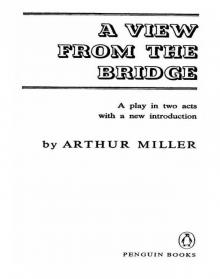 A View From the Bridge: A Play in Two Acts
A View From the Bridge: A Play in Two Acts Broken Glass
Broken Glass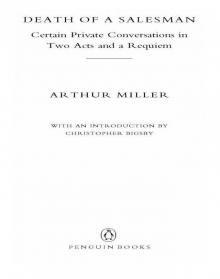 Death of a Salesman
Death of a Salesman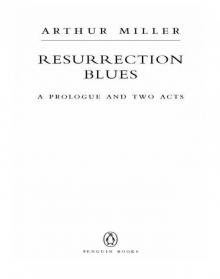 Resurrection Blues
Resurrection Blues All My Sons
All My Sons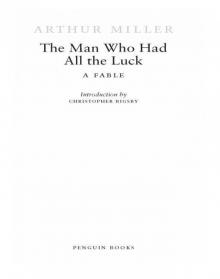 The Man Who Had All the Luck
The Man Who Had All the Luck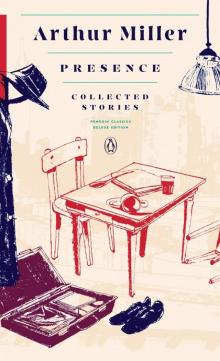 Presence: Stories
Presence: Stories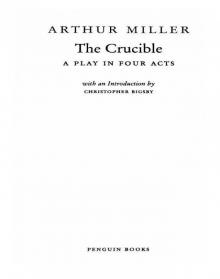 The Crucible
The Crucible Collected Essays
Collected Essays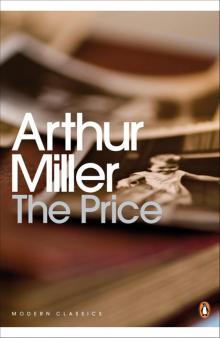 The Price
The Price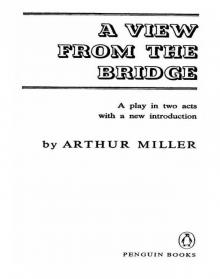 A View from the Bridge
A View from the Bridge Timebends
Timebends The Penguin Arthur Miller
The Penguin Arthur Miller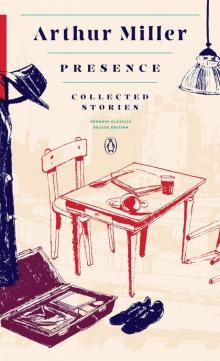 Presence
Presence